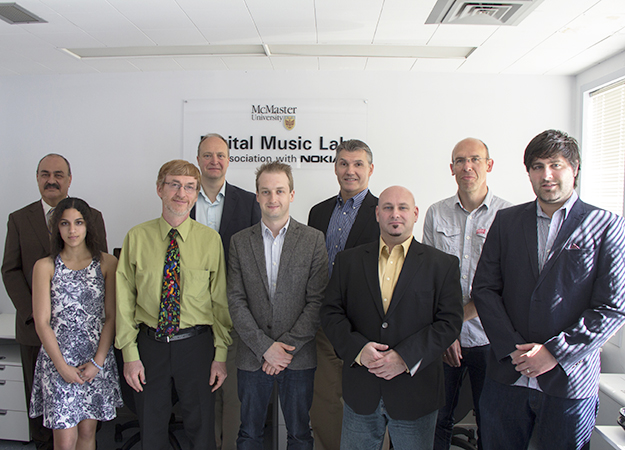Nokia team impressed with interdisciplinary Digital Music Lab

A team from the telecommunications giant Nokia visited the new McMaster Digital Music Lab in Association with Nokia Wednesday. Mike Bebel, global head of music with the Finnish company (centre, back row), was impressed with the innovative nature of the lab space.
Mike Bebel knows his music, and he liked what he heard — and saw — at McMaster.
Bebel, global head of music at Nokia and a seasoned industry veteran, was on campus Wednesday for a first-hand look at the University’s new Digital Music Lab in Association with Nokia.
Since opening in March under the direction of assistant professor Matthew Woolhouse, the facility in Togo Salmon Hall has been used to examine a vast array of sociological, cultural and musicological trends around the world, ranging from the sleep patterns of Scandinavians living above the Arctic Circle to the influence of American slang in rural Russia. Using anonymous data pulled from Nokia’s massive global music-download data set, findings are based on the genre, style and language of the music being consumed, and the time and general location of each download.
“This is ultimately for the greater good. We owe a part of our time and energy to endeavours like this, and it fits well within our core values,” says Bebel, who visited the University as part of a five-person delegation from Nokia. “We also want to help McMaster students better understand large data sets, and comprehend patterns. Both are so important to the future of research.
“I’m very impressed with the amount of interdisciplinary interest at McMaster with regards to the lab,” he adds.
Mo Elbestawi, vice-president, Research and International Affairs (and a noted jazz enthusiast), was among those to meet with the Nokia team.
“Music informatics is a very interesting area. It’s a unique combination of music and technology,” says Elbestawi. “A project like this increases the reputation of the Faculty of Humanities, Matthew’s department and students at McMaster. It also gives our students that many more opportunities to conduct research.”
One such student, Jotthi Bansal, says working in the lab this summer has provided an amazing opportunity to conduct hands-on research in her field. The Digital Music Lab has also allowed her to connect with students from a number of different disciplines and faculties, including Humanities, Engineering and Science.
“It’s fantastic,” says Bansal, a third-year Psychology, Neuroscience & Behaviour student who specializes in music cognition. “I’m hoping to bring more of a psych approach to this project, and examine things such as tempo, lyric analysis, music and migration patterns and the career trajectories of major artists.” For the latter, she’s already looked at album sales following Michael Jackson’s death in 2009, with his back catalogue “skyrocketing” within hours of the story breaking, she says.
The lab exists thanks to a five-year data sharing and cooperation agreement with Nokia, along with a $75,000 Social Sciences and Humanities Research Council Insight Development Grant and a $7,000 Arts Research Board grant.
A joint website between McMaster and Nokia is currently being developed, which will provide updates on research conducted in the Digital Music Lab.
Anthony Montenegro, head of Americas, Nokia Music; Rich Brooks, head of consumer data & analytics, Nokia Entertainment; Craig Hughes, business analyst, Nokia Music; and Matthew Pearson, data quality program manager, Nokia Entertainment, also toured the lab space on Wednesday.


